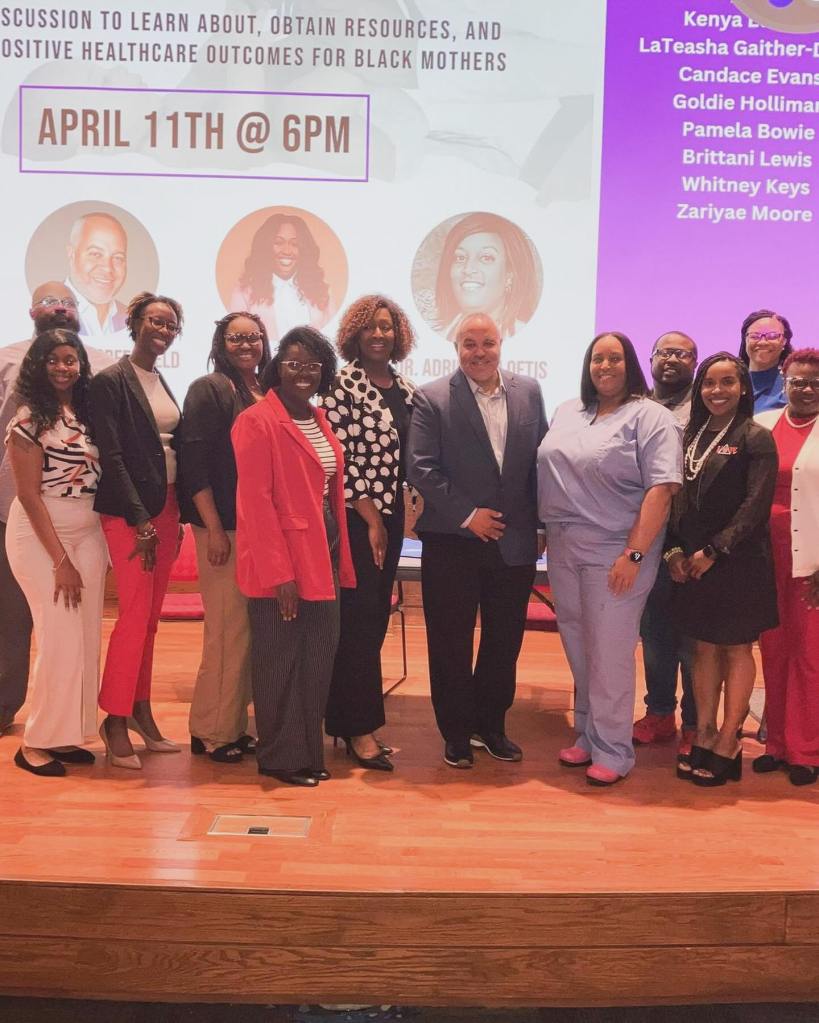
(PHOTO COURTESY OF NYIT COLLEGE OF OSTEOPATHIC MEDICINE AT ARKANSAS STATE FACEBOOK)
A panel discussion was held at Arkansas State to discuss Black Maternal health and steps to prevent the maternal death of Black mothers April 11.
The panel featured speakers Dr. Brook Laurent, Dr. William Greenfield, Amber Ray and Dr. Adrienne Loftis. The purpose of Black Maternal Health Week is to bring awareness, activism, and community-building to improve the health of Black mothers.
The event’s sponsors were the Division of Diversity, Mu Omicron Lambda chapter of Alpha Phi Alpha Fraternity; Kappa Nu Omega chapter of Alpha Kappa Alpha Sorority, Inc.; the Jonesboro Alumnae chapter of Delta Sigma Theta Sorority, and Sigma Gamma Eta chapter of Zeta Phi Beta Sorority.
In Arkansas, 92% of maternal deaths are preventable with African American mothers being more likely to die than any other race.
“I hope the impact is that Black women specifically, and those who support them, are empowered to advocate for themselves when they are in the process of giving birth before, during, and after,” said Evette Allen, Ph.D., assistant dean of Diversity, Equity, and Inclusion.
The panelists highlighted factors contributing to negative experiences in maternal healthcare, including bias in healthcare professionals and inadequate support for patients. Amber Ray, a family nurse practitioner and childbirth educator at NEA Baptist, said health professionals can be biased in their work.
“When we look at healthcare, we have bias a lot of times towards different cultures, races, nationality, language barriers,” Ray said. “We see that with Black maternal health, it does become about race. A lot of times, if we stratify even the different types of mothers that are Black from education level, all the way to insurance, they’re all falling mostly in the same pot of they’re not getting the maternal health care that they need.”
The panelists also emphasized the importance of recognizing and addressing health disparities, the needs of marginalized communities and acceptable options to improve maternal health.
Mothers in marginalized communities often receive lower-quality care due to low income.
Greenfield said his goal is to promote health and wellness to decrease the mortality rate of Black women through fair treatment, medicines, and extra care. He said treating patients kindly, providing medicine to treat pain and caring for their needs can go a long way in improving maternal health for African American women.
The panelist stressed the importance of prioritizing women during maternal stages and included the need for individuals to speak up and seek support during pregnancy plus childbirth.
“Maternal health for all is incredibly important, specifically on the issues of Black maternal health, raising awareness to that and it specifically is important because we have had a disproportionate mortality rate affecting African American women and Native American women not only in this state but in this country,” Greenfield said.
The panelists said that for maternal deaths in Black women to be prevented, doctors and nurses should utilize compassionate care and provide adequate support to patients. This can include providing needed medications, life-saving measures and more.
“I want to make sure that we look at this number and we say why is there a difference, and how can we make this difference go away,” Loftis, an obstetrician-gynecologist at St. Bernards Medical Center, said.
Categories: News

Leave a comment